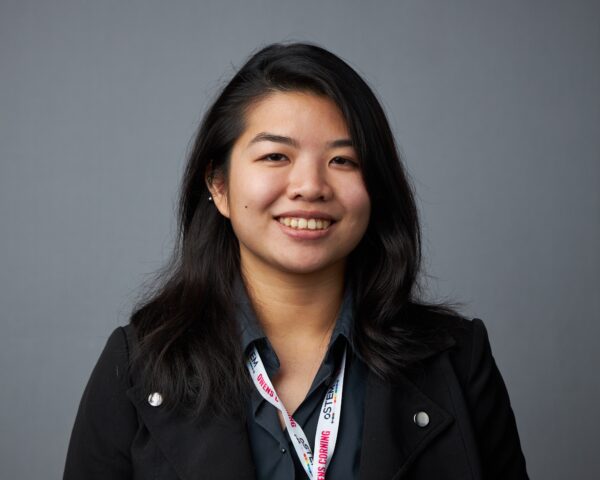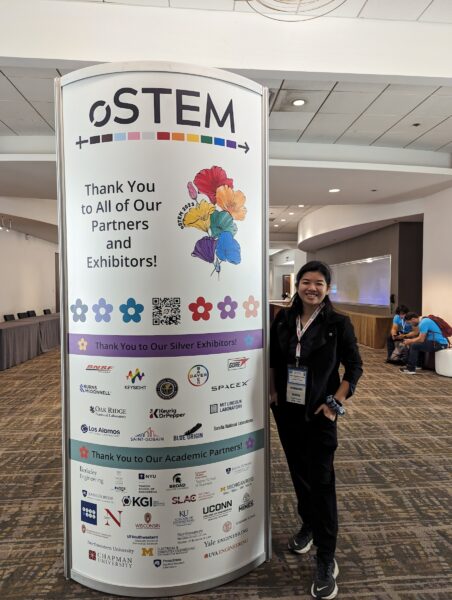UChicago graduate brings data science skills to behavioral science lab
Data scientists know the power of their skills. What they sometimes don’t know is that the world of non-data scientists doesn’t quite understand what those skills can do.

This is one lesson Maria Clarissa Fionalita learned in the months after she graduated from the Masters in Science in Applied Data Science program. As a Research Specialist at the Roman Family Center for Decision Research at Chicago Booth, she seized the opportunity to take part in more of the exciting and complex analytical work being done at the lab.
“As a data scientist, it’s up to you a lot of the time to figure out how to apply your skills in contexts where people don’t know all that data science is capable of,” Fionalita says. “The skills I learned in the program were super useful and super interdisciplinary to the point that my superiors at the lab were curious to know what else I might be able to do. That’s when I understood that these are skills people really need.”
With its focus on human behavior and the ways individuals form judgments and make decisions, the lab and its data provided Fionalita with a seemingly bottomless chance to showcase her skills. In fact, now that the word is out, people from all over are reaching out to her.
“I’ve been helping the lab making strategic outreach plans using my dashboard, for example. Researchers have also been reaching out for help with data engineering and web scraping tasks,” she says. “Researchers from across the University have reached out asking if I have an applied AI idea that could be turned into a venture or start up. It’s really been amazing.”
Everything just clicked
Unlike many in the Applied Data Science program, Fionalita doesn’t have a tech background. Growing up in Indonesia, she studied finance and accounting in college and went on to work for an accounting firm after graduating.
But at the start of the pandemic she decided she’d learn to code. After completing a few selective online coding courses, she wanted to pursue it further. But where would she take it?
“It was through an online coding community that I learned about data science,” she says. “Those discussions really opened my eyes. I realized that I really liked finding patterns in data and using it for storytelling and uncovering insights. It just seemed fascinating to me that you could answer business questions using data.”
Having been out of school for a number of years, Fionalita says the first classes she took in the Applied Data Science program felt challenging. But after the first quarter or two, despite the increasing difficulty of the courses, she found her footing.
“That was the amazing part,” she says. “I started out feeling pretty intimidated by the content, but then there came a point where everything just clicked and it felt like I was understanding everything the professor taught in class. It really shows how well designed the curriculum is.”
The full student experience
Foreshadowing Fionalita’s eagerness to apply data science to her work at the Roman Family Center for Decision Research, she elected the Applied Data Science program’s new research path when it came to her Capstone Project. “It seemed like a rare chance to do something I could only do as a university student,” she says. “That’s what drew me to doing a research-based capstone.”
Working with a team of fellow students, her capstone focused on leveraging the potential of large language models (LLMs) to automate radiology reports generation. Automating the documenting process using LLMs could potentially save time and reduce stress for radiologists, who presently spend up to fifty percent of their time drafting reports.
“Doing the LLM research was very new and exciting,” she says. “I really welcomed the challenge of discovering what I could do if I really put my mind and effort into something. It turned out really well.”
 Her Capstone Project gave her the opportunity to do something else she’d always wanted to do: present at an academic conference. Funded by the University of Chicago’s Data Science Institute program, Fionalita traveled to Anaheim, California for the 13th Annual oSTEM Conference.
Her Capstone Project gave her the opportunity to do something else she’d always wanted to do: present at an academic conference. Funded by the University of Chicago’s Data Science Institute program, Fionalita traveled to Anaheim, California for the 13th Annual oSTEM Conference.
“Presenting at the conference seemed like another one of those experiences I could only have as a student,” she says. “While there I met computer scientists, mathematicians, physician researchers, and a variety of other scientists. Presenting to a broad range of backgrounds helped me understand what different types of people care about and want to know from the project.”
A proactive mindset yields a positive impact
Back at the lab, colleagues and researchers continue to reach out to Fionalita for her data insights. She’s currently preparing for a study about cloud services. It’s an area she admits she hasn’t had much experience with before, but when the opportunity arose she saw it as an excellent way to extend her skills further.
“The skills I developed in classes and through my capstone are the foundation for so much more,” she says. “But it was from talking outside of class with instructors and mentors in the program that I developed my sense for the demand these skills have. Now I understand what they meant when they told me it was a matter of showcasing my skills. It takes a proactive mindset to let people know how my knowledge and skills can have a positive impact on the work happening all around me.”